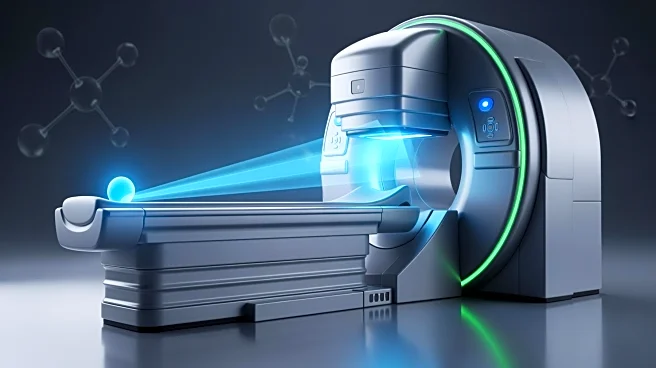What's Happening?
Eli Lilly and Company has made significant strides in Alzheimer's disease diagnosis with the FDA clearance of a blood biomarker test. This test, designed to detect Alzheimer's disease through blood samples, represents a monumental shift from traditional diagnostic methods like PET scans and spinal taps, which are invasive and less accessible. The blood test measures beta-amyloid and tau proteins, which are indicative of Alzheimer's, offering a less invasive and more accessible option for early diagnosis. This development is expected to improve the diagnostic process, allowing for timely and accurate identification of the disease, which is crucial for effective treatment planning.
Why It's Important?
The introduction of a blood biomarker test for Alzheimer's disease is a significant advancement in medical diagnostics, potentially transforming how the disease is identified and managed. Early and accurate diagnosis is critical for Alzheimer's patients, as it allows for timely intervention and planning, which can improve quality of life and treatment outcomes. This test could increase access to diagnosis, especially in underserved areas, and reduce the stigma associated with Alzheimer's by facilitating earlier conversations between patients and healthcare providers. The broader impact includes potential changes in healthcare policy and insurance coverage, as well as increased research opportunities in Alzheimer's treatment.
What's Next?
Following the FDA clearance, the focus will be on implementing the blood biomarker test in clinical settings. This involves ensuring that healthcare providers are educated on interpreting the test results and that the tests are available at scale. Additionally, discussions around insurance coverage and patient acceptance will be crucial to ensure widespread adoption. Eli Lilly aims to overcome logistical challenges to make the test accessible to all patients, potentially leading to a shift in how Alzheimer's disease is diagnosed and managed across the U.S.
Beyond the Headlines
The development of the blood biomarker test also raises ethical and logistical questions about patient access and healthcare equity. Ensuring that all patients, regardless of location or socioeconomic status, can benefit from this advancement is a challenge that healthcare systems must address. Furthermore, the test could lead to earlier interventions, which might change the landscape of Alzheimer's treatment, emphasizing preventive measures and lifestyle modifications.









